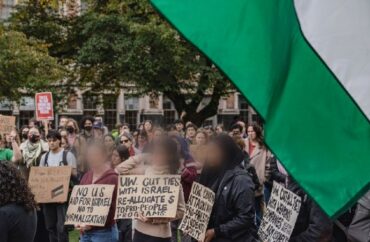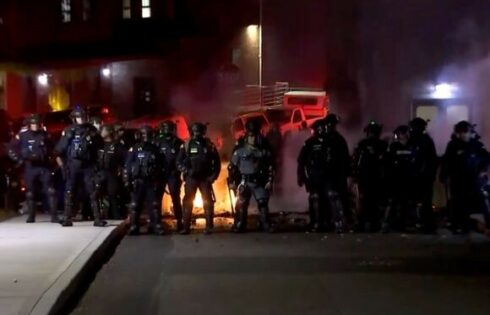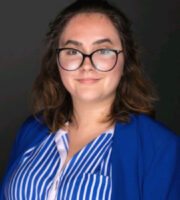
But some pro-Israel individuals on campus still fear speaking out
The University of Washington, following a year-long surge of anti-Israel protests on campus, reaffirmed its commitment to protecting the Jewish community in response to a recent warning letter from the Trump administration.
The public university was one of 60 that received letters from the U.S. Department of Education this month, warning that the federal government could pull their funding if they “do not fulfill their obligations under Title VI of the Civil Rights Act to protect Jewish students on campus.”
Spokesperson Victor Balta told The College Fix the university “stands firmly against antisemitism.”
“The University of Washington … agreed with the U.S. Department of Education’s Office of Civil Rights earlier this year to five actions that will strengthen the UW’s commitment to timely and effective responses to complaints filed by students, faculty and staff,” he said.
According to the agreement, these actions include: reviewing and updating policies and procedures; reporting regularly to the Office of Civil Rights on its work; providing “regular training” to employees on “discrimination” and “harassment,” as well as anti-discrimination training for students and employees; and conducting a “climate assessment” to evaluate its progress.
Balta told The Fix the March 10 letter from the Office of Civil Rights has “no indication that a new investigation is underway or that the terms of the agreement we announced in January have changed.
“Those terms, it’s worth noting, require the UW to report back to the Department of Education’s Office of Civil Rights on our progress related to the actions we agreed to take, and we will abide by those reporting requirements,” he said.
“We continue to engage with Jewish students, faculty, and community leaders as we implement our response to the recommendations made by the UW’s Antisemitism Task Force and work toward an even more welcoming environment for all students,” Balta said.
When asked about antisemitism on campus, one student, Sophia, told The Fix she believes many “don’t understand that Zionism is simply the belief that Israel has the right to exist as a country.” She asked that her full name not be used due to concerns about discrimination.
“Given that, it seems like Jewish students who believe historically displaced Jews should have land to live on and the right to share religious sites are considered anti-Palestinian, even if they do not support Israeli government actions,” she said.
“This exacerbates antisemitic discourse on campus and promotes division where there is already a lack of understanding on both sides,” Sophia said.
The university recently received a “D” on the Anti-Defamation League’s campus report card. The report cited high levels of “hostile anti-Zionist student government activity,” “hostile anti-Zionist student groups,” and “hostile anti-Zionist staff and faculty activity.”
The report card also acknowledged the presence of active Jewish organizations on campus, such as Hillel and Chabad.
Currently, the campus Hillel building requires visitors to be buzzed in through its security system, whereas other religious centers on campus do not.
A Hillel spokesperson declined to comment, and noted that The Fix may struggle to find students willing to speak about the issue due to “fear of retaliation.”
The Fix also reached out to Chabad, another Jewish group on campus, but did not receive a response.
Meanwhile, anti-Israel groups are active on campus. Students United for Palestinian Equality & Return organized two protests in February, where over 100 people gathered on campus in support of the Palestinian movement.
“Our fight was never about the ceasefire. The fight is for a single Palestinian state, from the river to the sea,” SUPER UW spokesperson Noah Weidht stated, according to The Daily, UW’s student newspaper.
On March 12, SUPER UW held an event where, according to its Instagram page, it intended to “pack the room” at a UW Board of Regents meeting. The organization criticized the university’s endowment investments, including Microsoft, Amazon, and Apple, alleging that the companies support Israel and “genocide.”
“UW holds both direct and indirect investments in companies and funds facilitating the occupation, apartheid, and genocide in Palestine,” SUPER UW stated in a social media post.
The group did not respond to two requests for comment from The Fix via social media, asking about the Trump administration’s warning letter and antisemitism on campus.
When the Trump administration sent its warning letter, Education Secretary Linda McMahon expressed disappointment that many universities are doing too little to protect Jewish students.
“The Department is deeply disappointed that Jewish students studying on elite U.S. campuses continue to fear for their safety amid the relentless antisemitic eruptions that have severely disrupted campus life for more than a year. University leaders must do better,” McMahon stated in a news release.
“U.S. colleges and universities benefit from enormous public investments funded by U.S. taxpayers. That support is a privilege and it is contingent on scrupulous adherence to federal antidiscrimination laws,” she said.
The Trump administration recently cut off $400 million in federal funding to Columbia University, citing its “continued inaction to protect Jewish students from discrimination.”
MORE: No-whites-allowed Illinois scholarship program for future professors under fire
IMAGE CAPTION AND CREDIT: Anti-Israel students protest at the University of Washington. Students United for Palestinian Equality & Return UW/Facebook
Like The College Fix on Facebook / Follow us on Twitter






Please join the conversation about our stories on Facebook, Twitter, Instagram, Reddit, MeWe, Rumble, Gab, Minds and Gettr.